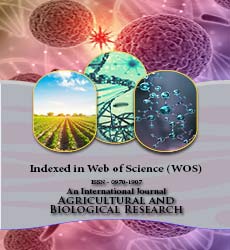Agricultural and Biological Research
RNI # 24/103/2012-R1
Kashf Wajid, Gull-e-Laala*, Nayla Haneef, Abd-ur-Rehman Khalid, Gulshan Irshad, Shawal Shakeel and Nigarish Saghir
Maize is an important cereal crop with huge global attraction and significant role as human food and animal feed. Various phytopathogenic fungal rots infect quality and quantity of maize before and after harvesting. The present study was designed intensively to combat the major objective of screening systemic fungicides against Fusarium verticilloide initiating stalk rot of maize. Various concentrations (20 ppm, 40 ppm) of synthetic fungicides viz., dithiocarbamate, ebuconazole 50%+trifloxystrobin 25% and prochloraz were evaluated in vitro against F. verticilloide. It was revealed that tebuconazole 50%+trifloxystrobin 25% at 60 ppm showed the strongest anti-mycotic potential 83.6% followed by prochloraz showing 75.19% mycelial inhibition of fungal rot, whereas dithiocarbamate was least effective at 7th day post inoculation respectively. Summarization of our results signified that trifloxistrobin 25%+tebuconazole 50% precisely controlled the maximum radial growth of F. verticilloide. It is therefore suggested that timely use of these fungicides may help in enhancing overall maize yield with good economic returns.
